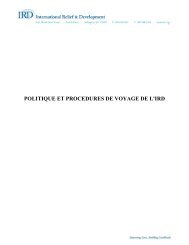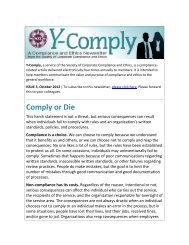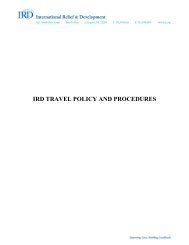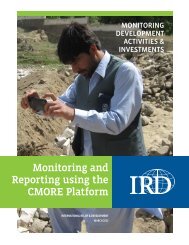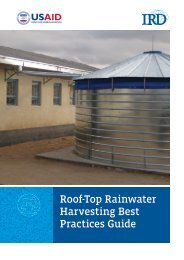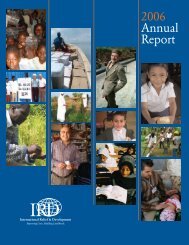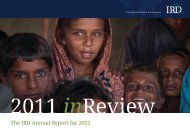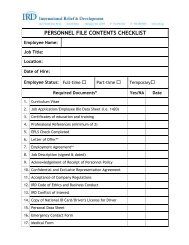Empowering citizens Engaging governments Rebuilding communities
Empowering citizens Engaging governments Rebuilding communities
Empowering citizens Engaging governments Rebuilding communities
You also want an ePaper? Increase the reach of your titles
YUMPU automatically turns print PDFs into web optimized ePapers that Google loves.
Even with the insecurity and growing<br />
threats, significant reductions or<br />
elimination of operations in neighborhoods<br />
and districts were rare, and IRD<br />
remained committed to the project<br />
People had learned to trust us<br />
In 2006, the final year of ICAP’s initial program and the<br />
beginning of CSP, staff turnover exceeded 25 percent.<br />
The costs of recruiting, hiring, and training new workers,<br />
in addition to operating without a full staff, were high.<br />
During one two-month period, ICAP lost six of its seven<br />
monitoring and evaluation officers as well as its top<br />
three finance officers. Many staff members were called<br />
upon to help launch CSP, but the insecurity drove many<br />
others away. When CSP became operational, staff turnover<br />
and emotional distress became even larger issues.<br />
For one reason, CSP was nationwide, not just Baghdad,<br />
which, despite the insecurity, was still safer than many<br />
of the country’s other cities and provinces.<br />
IRD management continued to work to minimize risk by<br />
adjusting protocol and activities, and, despite protests<br />
from staff in some instances, canceling projects<br />
or ceasing operations in certain areas. When IRD<br />
stopped working in the Makasib region of the Rashid<br />
district after the staff kidnappings, more than a dozen<br />
home reconstruction projects had been completed and<br />
staff had to abandon a good working relationship with<br />
community members because one or two community<br />
members were conspiring with insurgents against IRD.<br />
Even with the insecurity and growing threats, significant<br />
reductions or elimination of operations in neighborhoods<br />
and districts were rare, and IRD remained<br />
committed to the project. “When I talk about that<br />
time, I compare IRD to the UN or Red Cross,” said<br />
Vigeen Dola, an Iraqi national who joined IRD as a<br />
monitoring and evaluation manager after CSP started<br />
up. Before that, he worked for the Red Cross while his<br />
wife was working with the UN. Both were stationed<br />
in Iraq. On August 19, 2003, Dola’s wife was at work<br />
when a suicide bomber drove a cement mixer into the<br />
side of the UN headquarters in Baghdad, killing 23,<br />
wounding more than 100, and collapsing three floors<br />
of the facility. 7 His wife was only wounded.<br />
Following the attack, the UN withdrew most of its<br />
Baghdad staff. After another attack in October left<br />
12 more workers dead, the UN pulled out of Baghdad<br />
completely. “The UN dropped everything and left,” Dola<br />
said. “They had no obvious activities in the conflictzone<br />
areas. They had activities in the peaceful areas,<br />
in the north. But people in these conflict zones didn’t<br />
even have drinking water; they didn’t have electricity.<br />
Two months later, the Red Cross was bombed, and<br />
they did the same thing; they pulled out. I was there,<br />
working with them. I was not only confused, but angry.”<br />
Iqbal al-Juboori, who had not yet joined IRD’s staff<br />
and was working for the UN, was among the 50 or so<br />
UN employees who remained in Baghdad after the<br />
first attack. All UN operations had been suspended,<br />
and she had to work from home, conducting business<br />
through email correspondence. Al-Juboori said she<br />
understood why the UN had to pull out: “It was not<br />
a light decision for them to withdraw from Baghdad.<br />
A lot of people had died.” However, like Dola, she<br />
said the UN needed to at least maintain some kind<br />
of public presence in Baghdad to send a message to<br />
the Iraqi people “as well as to those who intended<br />
to do them harm.” IRD, due in some combination to<br />
its size, flexibility, and organizational commitment,<br />
stuck around, even if it had to adjust operations.<br />
To local Iraqis and other aid professionals, such as<br />
Dola and al-Juboori, this commitment helped set IRD<br />
apart in the eyes of <strong>citizens</strong> who might be naturally<br />
disinclined to trust outsiders. “I joined IRD in 2005,<br />
and I’ve seen some really bad days,” al-Juboori said.<br />
“But whenever we encountered tragedy or trouble, IRD<br />
would become more fixed and determined, no matter<br />
what the obstacles or the challenges were. And there<br />
were great, great challenges. But people had learned<br />
to trust us.”<br />
IRD’s close working relationship with the community<br />
continued throughout the evolution of ICAP, which<br />
was extended and which not only ran concurrently<br />
1<br />
Building community trust<br />
19


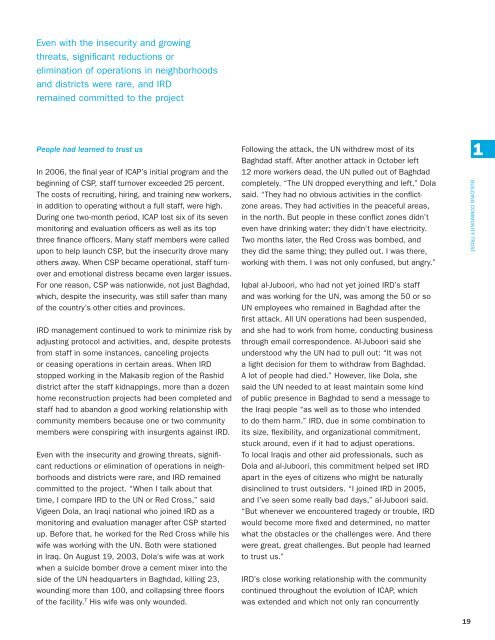
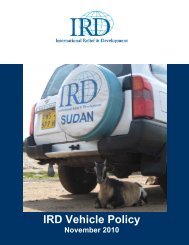
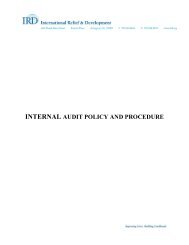
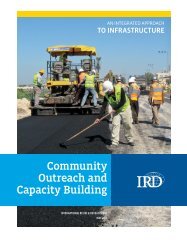
![Guide bonne pratique production d'oignon qualité_VF_4_2411012[1]](https://img.yumpu.com/23506639/1/184x260/guide-bonne-pratique-production-doignon-qualitac-vf-4-24110121.jpg?quality=85)
